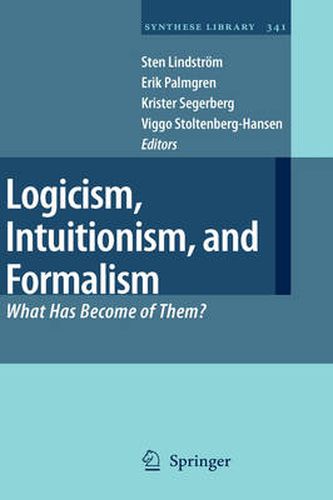Readings Newsletter
Become a Readings Member to make your shopping experience even easier.
Sign in or sign up for free!
You’re not far away from qualifying for FREE standard shipping within Australia
You’ve qualified for FREE standard shipping within Australia
The cart is loading…






This title is printed to order. This book may have been self-published. If so, we cannot guarantee the quality of the content. In the main most books will have gone through the editing process however some may not. We therefore suggest that you be aware of this before ordering this book. If in doubt check either the author or publisher’s details as we are unable to accept any returns unless they are faulty. Please contact us if you have any questions.
The present anthology has its origin in two international conferences that were arranged at Uppsala University in August 2004: Logicism, Intuitionism and F- malism: What has become of them? followed by Symposium on Constructive Mathematics . The rst conference concerned the three major programmes in the foundations of mathematics during the classical period from Frege’s Begrif- schrift in 1879 to the publication of Godel’ .. s two incompleteness theorems in 1931: The logicism of Frege, Russell and Whitehead, the intuitionism of Brouwer, and Hilbert’s formalist and proof-theoretic programme. The main purpose of the conf- ence was to assess the relevance of these foundational programmes to contemporary philosophy of mathematics. The second conference was announced as a satellite event to the rst, and was speci cally concerned with constructive mathematics-an activebranchofmathematicswheremathematicalstatements-existencestatements in particular-are interpreted in terms of what can be effectively constructed. C- structive mathematics may also be characterized as mathematics based on intuiti- isticlogicand,thus,beviewedasadirectdescendant ofBrouwer'sintuitionism. The two conferences were successful in bringing together a number of internationally renowned mathematicians and philosophers around common concerns. Once again it was con rmed that philosophers and mathematicians can work together and that real progress in the philosophy and foundations of mathematics is possible only if they do. Most of the papers in this collection originate from the two conferences, but a few additional papers of relevance to the issues discussed at the Uppsala c- ferences have been solicited especially for this volume.
$9.00 standard shipping within Australia
FREE standard shipping within Australia for orders over $100.00
Express & International shipping calculated at checkout
This title is printed to order. This book may have been self-published. If so, we cannot guarantee the quality of the content. In the main most books will have gone through the editing process however some may not. We therefore suggest that you be aware of this before ordering this book. If in doubt check either the author or publisher’s details as we are unable to accept any returns unless they are faulty. Please contact us if you have any questions.
The present anthology has its origin in two international conferences that were arranged at Uppsala University in August 2004: Logicism, Intuitionism and F- malism: What has become of them? followed by Symposium on Constructive Mathematics . The rst conference concerned the three major programmes in the foundations of mathematics during the classical period from Frege’s Begrif- schrift in 1879 to the publication of Godel’ .. s two incompleteness theorems in 1931: The logicism of Frege, Russell and Whitehead, the intuitionism of Brouwer, and Hilbert’s formalist and proof-theoretic programme. The main purpose of the conf- ence was to assess the relevance of these foundational programmes to contemporary philosophy of mathematics. The second conference was announced as a satellite event to the rst, and was speci cally concerned with constructive mathematics-an activebranchofmathematicswheremathematicalstatements-existencestatements in particular-are interpreted in terms of what can be effectively constructed. C- structive mathematics may also be characterized as mathematics based on intuiti- isticlogicand,thus,beviewedasadirectdescendant ofBrouwer'sintuitionism. The two conferences were successful in bringing together a number of internationally renowned mathematicians and philosophers around common concerns. Once again it was con rmed that philosophers and mathematicians can work together and that real progress in the philosophy and foundations of mathematics is possible only if they do. Most of the papers in this collection originate from the two conferences, but a few additional papers of relevance to the issues discussed at the Uppsala c- ferences have been solicited especially for this volume.